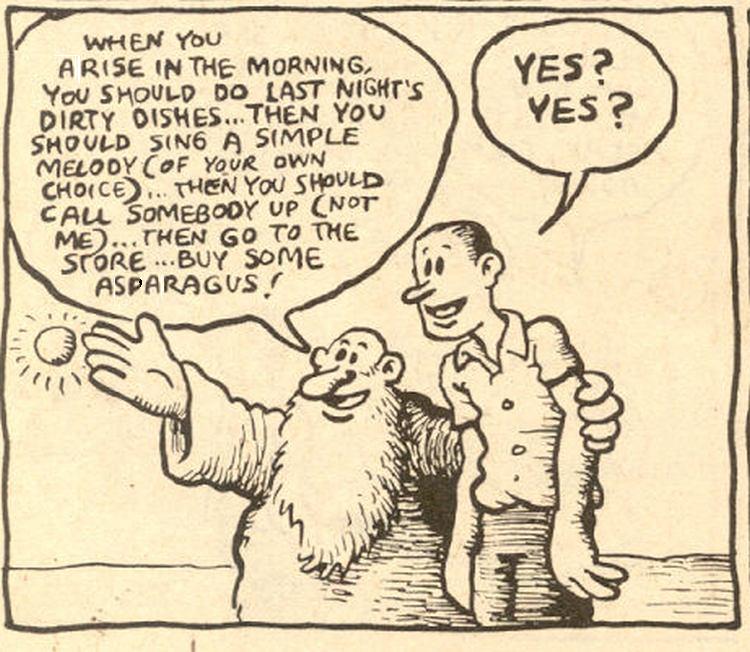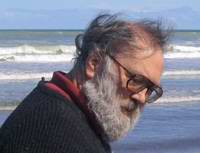Nearly all cultures, all civilisations, have some kind of Creation and Fall myth. There was a time when the world was one, but something happened and it is no longer so.
Maybe there was a Fall. Maybe there wasn't. If we're looking at a Darwinian universe, there was never a time or place when we weren't "fallen". But nearly all cultures have a story about a Fall, as if to explain why something is wrong.
And this that you're reading right now is a story, too. There is nothing in it that can be proven or demonstrated beyond argument. It is consistent with my experience, or an extrapolation from my experience, but that is all. It is ultimately backfill.
If I said that God created the universe, that would suggest that He was and remains separate from it.
If I said that God manifested, took form, as the universe, that would suggest that He is the totality of the universe, and that anyone who experiences, catches a glimpse of, this oneness of all creation is experiencing God.
In both of these "God" is understood to have existed before the universe began. There are other implications which flow from each of these stances.
The first version is that accepted by most practising Christians, Jews, and Muslims, and it is consistent with their present dualistic perception of the world. This second version is consistent with the view of mystics, of all faiths, and with my own experience - except that Buddhists posit no Deity or creation.
(Christian and Muslim mystics, especially Catholics, while they maintain theoretically that God remains separate, as is orthodox for their faith, very frequently imply otherwise in their personal descriptions of mystical experience.)
There is also a logical problem here. The experience of oneness does not allow for a separate God. One is One.
Only God understands Himself to be one with all creation, without other than Himself.
And only as we can transcend the belief in "God" and "not-God" can we rejoin Him in that experience.
Now, think, perhaps, of the analogy of a cancer cell in a human body, no
longer reproducing itself and relating to its fellows as part of the unit
human organism, but seeking to proliferate itself, nourish itself, using its innate
ability to do so, at the expense of the total human organism and without
regard for the needs of its host, until both are destroyed.
I believe that the physical creation we know and inhabit today is the
result of a creation turned cancerous, no longer subject to, or even
in touch with, the will of God in the ongoing creation and sustenance of
the Garden of Eden.
In this cancerous creation, we exist, every living organism exists, as a separate being, separate
from one another and separate from God, and acting to control
sufficient of our external environment to feed, clothe, and shelter
ourselves, and procreate according to our cancerous needs and not with any concern for the overall health of the world we inhabit. Those species that have been least efficient in the battle for survival have become extinct - 99% of all the species that have ever existed.
For the next part of the story, lets go back to the Garden of Eden. Was Eden, assuming it ever existed, a physical creation, such as we inhabit today. If it did, where and when, in this Darwinian universe was it located?
Or might it have been something else?
We couldn't even start to ask this question until we had considered the possibility of subtle matter. (Refer to The Siddhis)
For most people, their awareness is anchored in the coarser realms where God is not experienced directly. God is not a part of the physical, astral or concrete mental worlds to be experienced directly. Our consciousness must extend beyond these if we are to experience Him directly.
It is only as we reach soul consciousness that we begin to become aware, first of God, then of our unity, still as an individual, with all of creation, and finally, perhaps, of the undifferentiated oneness that is all of creation.
The suggestion I put forward is that Eden is God's manifestation as subtle matter. God is present in His creation and can be experienced directly only in the subtle levels of awareness attained by the mystic. The Garden of Eden, the Kingdom of God, is the "true" reality reported by mystics.
The event (or the process) of the Fall was the coming into existence of the coarser realms.
We have seen that the concrete mental body is the home of the siddhis. Among these is the ability to manifest material forms, as the Creative Visualisation people have discovered, as well as a number of healing abilities, and a number of more sinister talents.
My story is that Creation in the Garden shared these powers of God. Now, recall that the tree with the forbidden fruit was not named as an apple! It was specifically the tree of the knowledge of good and evil. Eating the fruit of this tree marked the transition from a unitive way of being to a dualistic way. Good and evil can only exist in relation to a "X"/"not-X" situation.
This is tentative. It has to be. Like any delving into a possible creation process, any conclusion typically raises more questions than it answers. What was the tree doing there in the first place? The traditions that we have are backfill, and they are not necessarily complete.
The coarser worlds, then, are the manifestation of not just mankind but the entire universe in separated, post-Fall mode. Bang!
-o0o-
And all of the above is backfill, surmise, story, metaphor, analogue, what if?
The starting point is the mystic's experience of oneness, of deity, of love, of "immortality", of a reality more real than anything known before.
Remember that the Buddhists pay little attention to these matters. The spiritual experience itself is what matters, as a means of dealing with the world, as a way of being in the world:
In the Majjhima Nikaya, a potential follower asks the Buddha for an answer to the problem of cosmogony:
Suppose someone was hit by a poisoned arrow and his friends and relatives found a doctor able to remove the arrow. If this man were to say, 'I will not have this arrow taken out until I know whether the person who had shot it was a priest, a prince or a merchant, his name and his family. I will not have it taken out until I know what kind of bow was used and whether the arrowhead was an ordinary one or an iron one.' That person would die before all these things are ever known to him. (Wikipedia).
Evolution, the Universe and all that:

At present, I see no reason to doubt the scenario laid out for us by such as Richard Dawkins, who in turn sees no reason to invoke any kind of deity in his account of the origin and development of life as he and his colleagues are able to measure it.
As far as he goes, and in his pursuit of parsimony, the simplest explanation, Dawkins is convincing.
As always, though, it might be a case of exactly what kind of deity one chooses not to believe in.
Those who press for some kind of creation event or process mandated, directed, accomplished by, a grand deity, are much less convincing than Dawkins, and are easily perceived as fools or worse, on their own showing, or against a background of the creationist church groups they represent.
As Da Avad Wudhi remarked, after half a lifetime of fixing people's backs: "How can you speak of intelligent design when a human spine functions optimally only when one is on one's hands and knees?"
Orthodox religion, at least in it's most public faces, is not convincing when it opposes evolutionary theory. In it's more moderate liberal expressions where it distances itself from the most violent advocates of creationism, it subsists instead on a diet of watery metaphor.
As a mystic, I am left with the problem that I begin with the direct experience of Deity, (or a unity that I call Deity), with the experience of "immortality", and above all with the experience of love, and find no place for these in Dawkins' account, whether by those names or any others, save when he dismisses them as superstition or ignorance or inappropriate survivals of primitive understanding.
And I think Dawkins fall short in this respect. Not because I can prove anything, but because the experiences themselves remain unaltered and personally clear, if unaccounted for, and for eons, in various guises, a part of human experience.
Sam Harris and his fellow "neurotheologians" may be bringing us somewhat closer to an understanding, and I watch with interest. Harris himself, one of the "new atheists", has in his condemnation of orthodox religion, retained and expressed an interest in and respect for Buddhism and similar mystical experience, and is concerned to explore it without the "God" trappings previously associated with it.
Harris expresses my own misgivings. The abuses contained in the history of orthodox religion, the bloodletting, the systematic torture and slaughter of "heretics" in the intests of "saving their souls", the political self-seeking, all at the highest level, from all of which it's grand cathedrals and its ceremonies and rituals are ultimately constructed, are such as to disqualify it from any standing in the search for the truth of the matter or as an expression of such truth.
To read even such as St Teresa of Avila today makes my skin crawl in the witness of her abject surrender to the authority and to all of the abuses of church officialdom. She comes through in effect as a poster girl for male Roman Catholic chauvinism.
Again, as Da Avad Wudhi expresses it, "The flag of God has never flown over a battlefield — or a cash register — though it is often claimed to do so."
In the latter 20th and early 21st centuries, mysticism is more often a solitary pursuit, reflecting contemporary mystics' abandonment of the Church as a credible home. It also reflects the persistence, thoughout a marvellously technological era, of human awareness of this particular group of phenomena.
I do not seek to discredit Dawkins so much as I would like to arrive at some kind of satisfactory synthesis - that my mind and my spirit could each sit comfortably with in the same body. Watch this space.

acknowledgements to r.crumb
.



